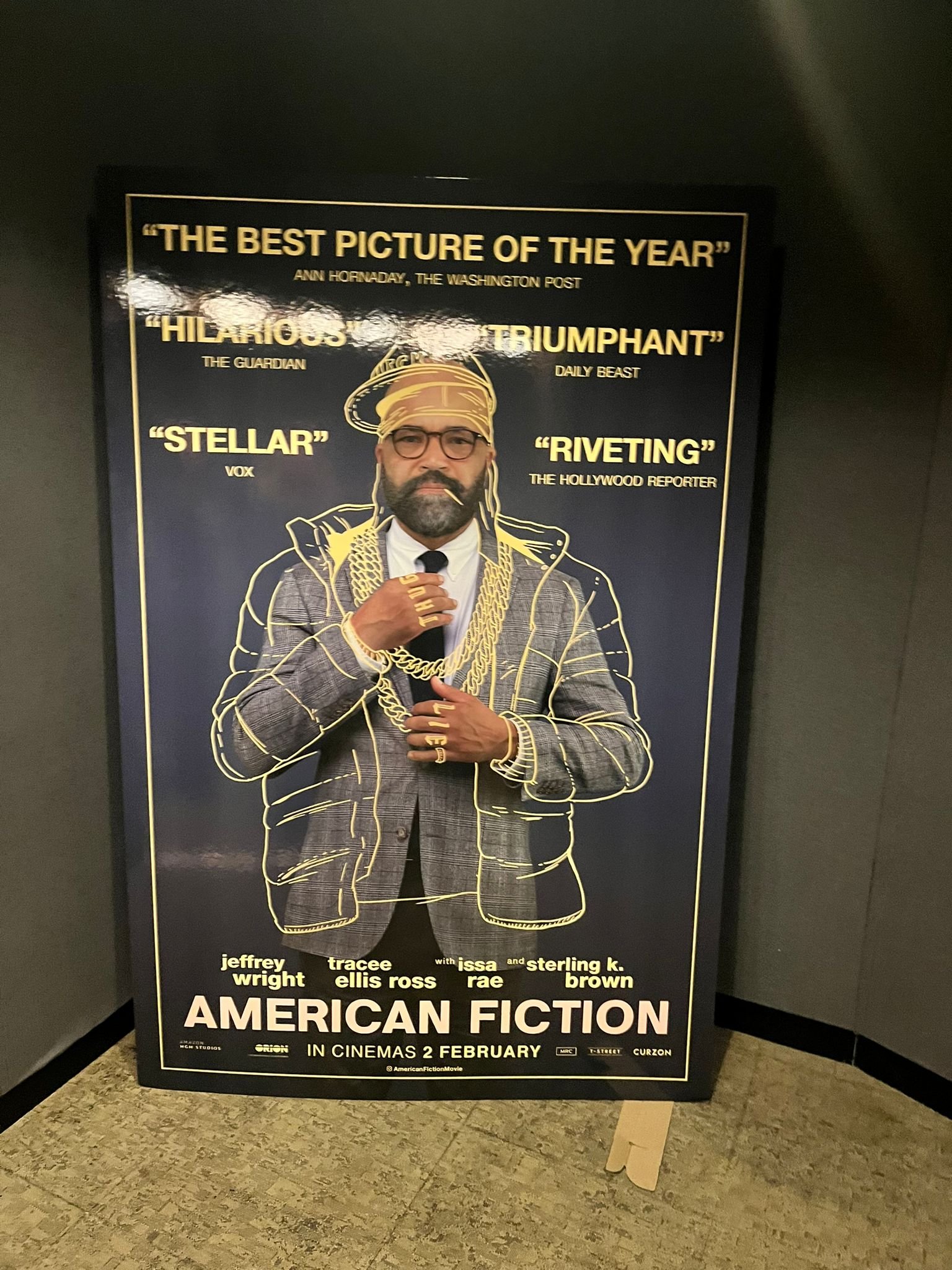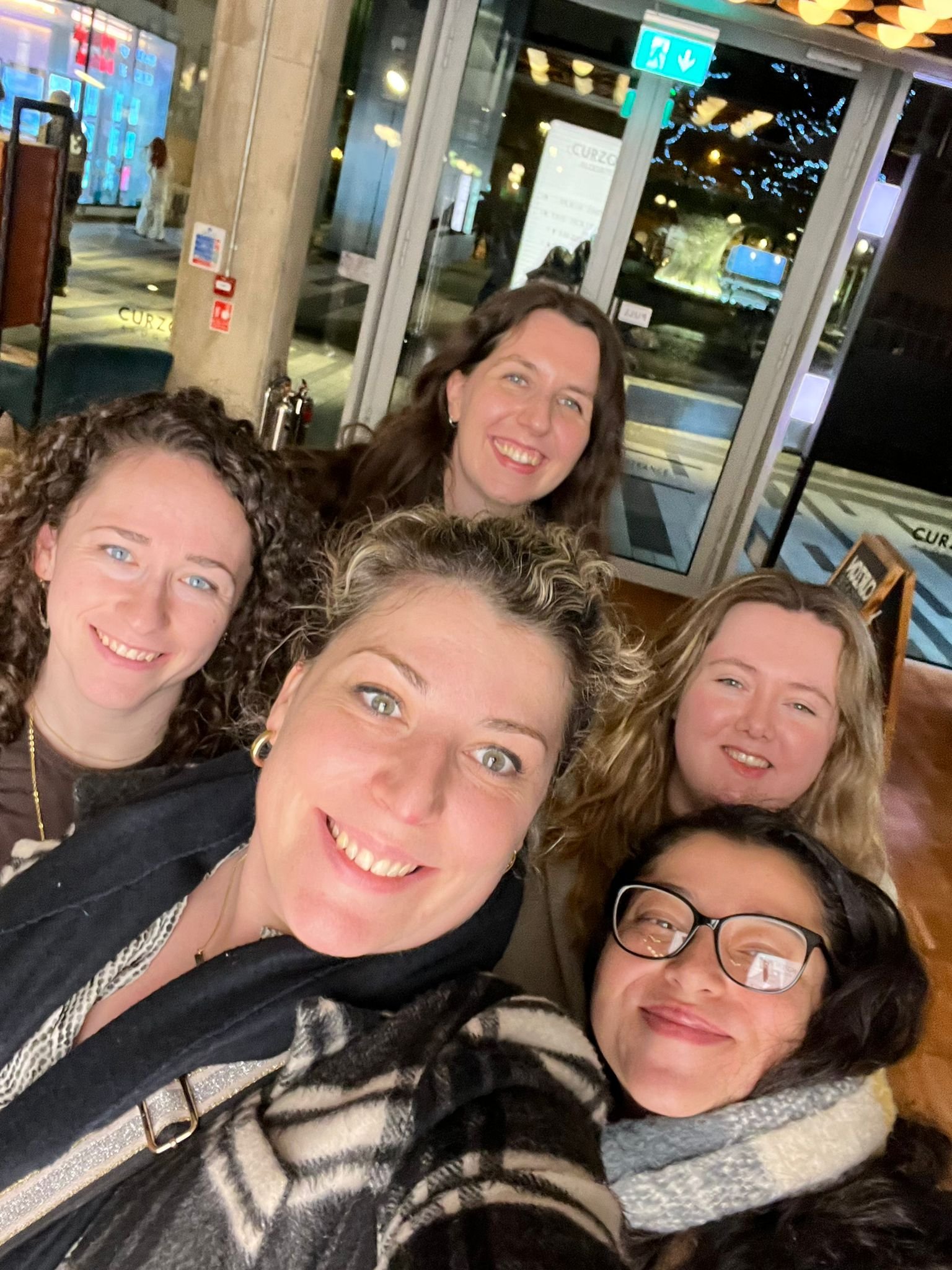Come with us to an Exclusive Screening of American Fiction
As a book club there are many book-related events that get us excited but none more so than a film adaptation! So, imagine how gassed we were when Tandem Collective reached out to invite us to an exclusive advanced screening of the hotly anticipated American Fiction at Curzon Cinema, Aldgate! Inspired by the formidably brilliant Erasure by Percival Everett, the film is intelligent, tender, cynically accurate and wildly funny. We all shed a tear whether from laughter or the big feels. Read below to find out what Brunch Book Clubbers Sabine and Kathryn had to say.
Sabine Tells Us about the Book that Inspired the Film
The venue was great, with cosy seating, and the fun surprise of a few hidden copies of the book that inspired the film under some chairs (and who doesn’t love a free book?!). As for the film itself, it definitely lived up to the hype. It was funny, smart, and somehow serious, mocking, and heartfelt all at once.
The main character Monk is a writer, but the only creative PhD in his family as his two siblings are both medical doctors. When we meet Monk, he is struggling to get more novels published, with the feedback that his stories don’t reflect the “true African-American experience”. While being called back home to help manage his family issues and personal life, he writes a novel as a joke out of frustration at the “black narrative” that publishers are hoping for, hoping to prove a point. Much to his chagrin, it becomes a bestseller, and takes on a life of its own. Through the film you get to watch Monk navigate this success (whether he would call it that) and the ways in which it is problematic.
Funny, smart, and somehow serious, mocking, and heartfelt all at once.
I first read a Percival Everett book about 18 months ago for Brunch Book Club. I picked up The Trees in my local bookstore and while it wasn’t at all what I expected, I really enjoyed Everett’s writing style and sense of humour while tackling issues of race in the US. I was then recommended another, much older, book by Everett by a long-time fan, Erasure. Again, Everett’s style comes through – not shying away from tough topics, and doing so in a parodic way that is incredibly smart.
While I would recommend anyone to read the book itself, I think the movie American Fiction does an amazing job in carrying the story and message into a new medium. While the book was published in 2001, I’m so glad it finally became a film – and director Cord Jefferson does it justice. It brings up the serious conversations about race and how industries (in this case, publishing) “diversify” in a way that makes the viewer feel comfortable to discuss and critique the status quo.
Characters that are complex and multifaceted, even to those with less screen time
The story is shared in an accessible way and changes made from the novel, soften the story slightly and bring the tale into the present day. The actors were all incredible, bringing life and dimension into characters that are complex and multifaceted, even to those with less screen time (with the exception of the publisher, who was more of a hilarious caricature, which might hit a little close to reality).
The ‘ghetto novel’ written by Monk takes up a chunk of Erasure itself, letting the reader experience the story first hand. This scene in the film American Fiction, I loved – it was creative and unique in letting us watch Monk write the novel, while giving us a taste of what he was doing – and obviously, they can’t quite throw a couple dozen pages of a new story in the middle of a film in the same way the novel does.
I would definitely recommend this film – it’s funny, smart, and will get you thinking more about diversity and representation in industries. Go with friends, and have a coffee after to discuss a little afterwards, and if you’re interested - I recommend picking up a copy of the book Erasure for the full experience. It’s definitely a story you won’t forget.
What did Kathryn think?
Curzon Aldgate is a small, relaxed cinema complete with wines, cocktails and snacks – including pizzas for you to take into your screenings, while I didn’t try any, it did look delicious and the coffee I had before the screening was excellent, if a bit pricey. But, it seems a million miles away from the popcorn riddled carpet, gallons of fizzy drinks and noisy children that I tend to imagine for a cinema, so definitely worth the premium.
We sat on couches for two during the screening, which were quite comfy and there was a lot of legroom for those vertically blessed.
For me, there were two key narratives the story surrounded itself with. The first was about how novelist, Monk, felt pigeonholed into writing about “the black experience” and how frustrated he was that for most publishers selecting books, that seemed to be a very one-dimensional trope-filled story that he was uninterested in writing about. Monk, fed up with this finally writes a ridiculous satire of this genre under a pseudonym, but this quickly backfires as publishers line up to get it, and a movie quickly gets into the works before the book is even released.
Monk had a very different life from the characters he creates in the satirical novel ‘Ma Pafologie’. He grew up in a middle-class household, his father and siblings are all doctors and Monk himself was a college-level professor and writer. The juxtaposition of that with the role the publishers of the book want him to fulfil (a criminal on the run from the FBI) is a really enjoyable and thought-provoking part of the story.
Given it was described as a comedy, I wasn’t expecting to come out of the film having shed tears.
The other key element of the film is looking at Monk’s personal life, specifically the relationships he holds with his family. His sister, played fantastically by Tracee Ellis Ross, plays one of the three siblings, who unsurprisingly as the woman, ends up being caretaker to their mother for the first part of the film before Monk has to step up. All three of the siblings were fantastic to watch on-screen and the bickering between them had excellent comic timing.
Personally, I think watching the narrative around his familial relationships was at times sad to watch, given the ailing mother and the obviously challenging relationship Monk had with his siblings stemming from childhood issues. The lows here allowed the highs of the funny quips and interactions to be even higher, but given it was described as a comedy, I wasn’t expecting to come out of the film having shed tears. But, in saying that, it was a warm, challenging watch and I would recommend it. The easiest way to prove how much I enjoyed it was that after watching the film, I instantly came away looking for the book it was based on in charity shops.







